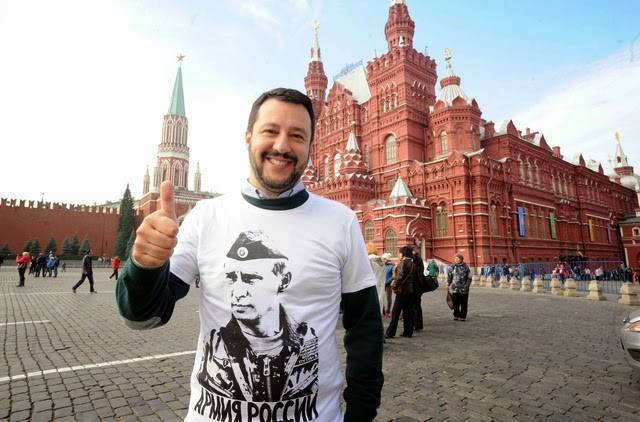Italy’s hung parliament reflects public disdain for business as usual
By Dan Alexe, New Europe, March 5,
2018
Italy’s
parliamentary elections ended on Sunday in what appears to be a hung
parliament, a draw that could prevent the formation of a coalition
government and thus to new elections.

Northern
League (Lega Nord) leader Matteo Salvini on Moscow's Red Square wearing a Putin
t-shirt with the words "Russian Army" on the front after he signed a
co-operation deal with the Kremlin in March 2017.
Italian
daily La Repubblica on Monday summarised the situation, saying, “The
country is living in permanent instability, ungovernability is now an
endemic disease”.
About
half of the Italian electorate voted for parties that were only recently
marginal protest groups led by maverick figures such as Beppe Grillo, the
foul-mouthed former comedian and blogger, who in 2010 founded the
Movimento 5 Stelle party or 5-Star Movement as it is known in English.
Led by Luigi Di Maio, the populist 5-Star Movement came out as the main
winner of Sunday’s poll, with roughly 31% of the votes. After the numbers
were released, Di Maio announced that 5-Star will not form a
coalition with other parties to form a government.
The other
big winner to come out of Sunday’s election was the Milan-based Northern League
(Lega Nord), whose far-right, ultranationalist, anti-immigrant, and Eurosceptic
rhetoric appeared to touch a chord with many Italian voters. The Northern
League overtook its ally Forza Italia – the centre-right populist party of
81-year-old, three-time former prime minister Silvio Berlusconi.
Berlusconi
remains barred from running for office because of a tax-fraud conviction, but
he is looking to play a key role in any future government having backed
European Parliament President Antonio Tajani as his nominee for prime
minister.
Tajani
will now have to battle coalition partner Matteo Salvini, leader of
the Northern League, for the leadership of the centre-right bloc and to be
in a position to be nominated as Italy’s next prime minister.
The
Northern League appeared to receive open support from US President Donald J.
Trump‘s former chief ideologue, Steven Bannon, who was in Rome to offer his
backing for a party that he sees as a key cog in his campaign to weaken
political centrists.
Salvini
is known for his close ties to Russian President Vladimir Putin and signed
a co-operation deal with the Kremlin in March 2017. 5-Star has also called
for a foreign policy shift away from Brussels and the Euro-Atlantic
alliance and instead called for a lifting of the EU’s sanctions on
Russia. Grillo has in the past praised Putin as a strong statesman,
calling him “a blessing for mankind”.
The
Northern League’s economics chief on Monday raised the possibility of an
alliance with 5-Star, opening the door for a potential future Italian
government that would be Eurosceptic and anti-NATO, likely to challenge EU
budget restrictions and have little interested in further European integration.
A
Northern League/5-Star coalition would be a boon for the Kremlin which has had
to weather several election disappointments in Europe after its successes in
2016 when voters in the UK opted to leave the EU and American voters handed the
White House to Donald Trump – both seen as major foreign policy wins for Putin.
Moscow
has long hoped to gain a foothold in Rome after cultivating close ties with
Italy’s once-powerful Communists under Palmiro Togliatti in the 1940s and the
Brigate Rosse (Red Brigades) – a radical Marxist terror organisation that
kidnapped and later assassinated Christian Democrat Prime Minister Aldo Moro in
1978.
Final
poll numbers are not due until later Monday and, with the centre-right
coalition of Forza Italia and the Northern League on course for 37% of the vote
and 5-Star with 31%, swift new elections to try to break the deadlock are
another plausible scenario.
Former
Prime Minister Matteo Renzi’s Democratic Party crumbled under the stiff
anti-establishment mood in the country, gaining only 20% of the votes – the
party’s worst result since it was founded in 2007.
The
Italian Parliament’s first post-election meeting will take place on March 23,
though President Sergio Mattarella is not expected to open formal talks on
forming a new government until early April.
If no
party gains an overall majority, they may attempt to form further alliances, or
new elections will be called.


